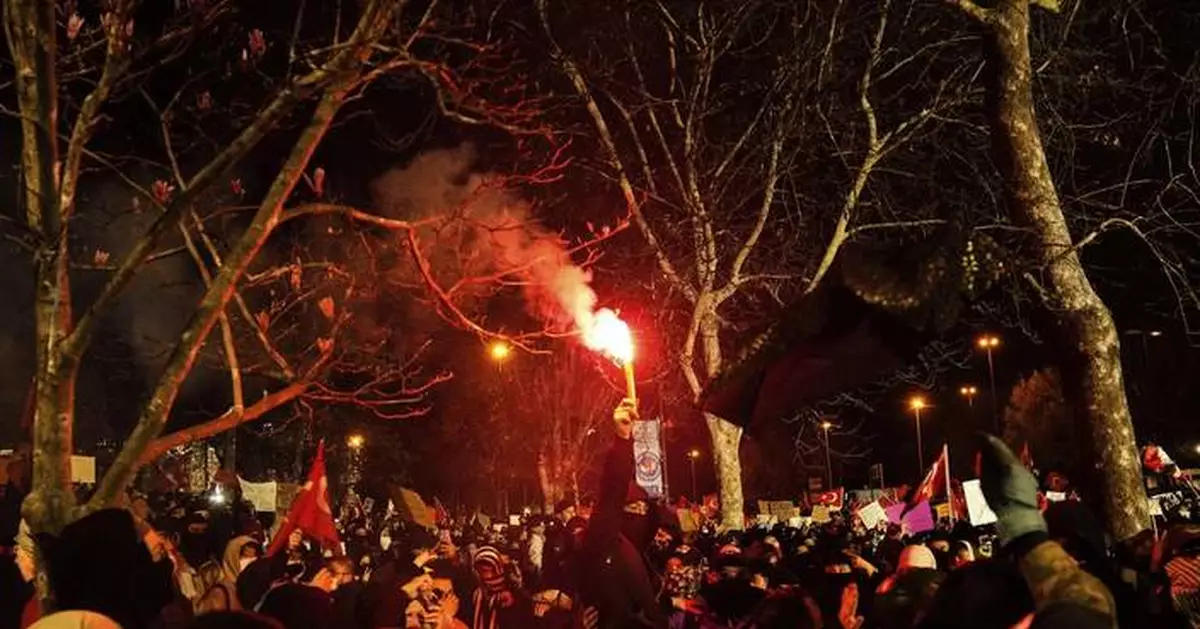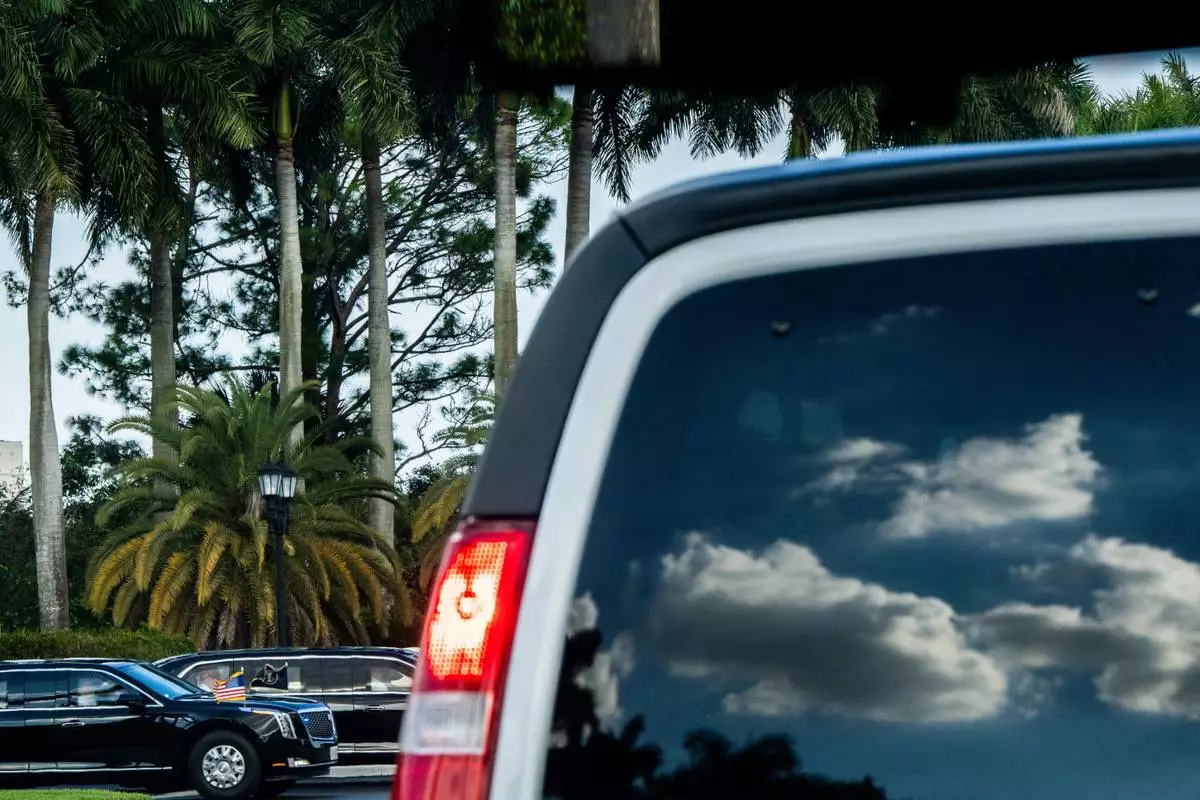ISTANBUL (AP) — The head of Turkey's main opposition party visited jailed Istanbul Mayor Ekrem Imamoglu on Tuesday after six nights of massive protests calling for his release.
Imamoglu, arrested on March 19 on corruption charges, is seen as the main challenger to President Recep Tayyip Erdogan’s 22-year rule. His arrest has been widely viewed as politically motivated and sparked demonstrations, some turning violent, across the country. The government insists Turkey’s judiciary is independent and free of political influence.
Ozgur Ozel, the leader of Imamoglu's Republican People’s Party, or CHP, held a two-hour meeting with Imamoglu at Silivri prison, west of Istanbul. Ozel told reporters that he was “ashamed on behalf of those who govern Turkey of the atmosphere I am in and the situation that Turkey is being put through.”
He described Imamoglu and two jailed CHP district mayors he also met as “three lions inside, standing tall, with their heads held high … proud of themselves, their families, their colleagues, not afraid.”
Ozel later spoke at what he said would be the last rally in front of Istanbul's City Hall, saying the party would appoint an acting mayor in Imamoglu's place in hopes of staving off a state-appointed replacement.
Ozel announced plans for a demonstration on Saturday at another location in Istanbul and warned the governor, a government appointee in charge of police, not to allow any violence at the final City Hall gathering.
“If you provoke this square tonight, if you use tear gas or attack, I will change our plan for the coming days. I will make a call for 500,000 people to (come to) the place that will disturb you the most,” he said.
Students across Turkey protested and occupied campuses on Tuesday after declaring a boycott of classes. In Istanbul, thousands gathered in a park before marching to Sisli district, where the elected mayor has been jailed and replaced with a government appointee.
Meanwhile, Turkish authorities have been cracking down on journalists as protests have grown.
The Media and Law Studies Association, a civil society group, said 11 journalists who were detained for covering banned protests in Istanbul were brought to the city’s Caglayan Courthouse to answer charges of violating the law on meetings and demonstrations.
The journalists were among more than 200 people prosecutors have recommended for imprisonment pending trial, including left-wing activists rounded up at their homes in raids early Monday. By late Tuesday, 172 people, including seven journalists, had been jailed ahead of trial.
Among those sent to pretrial detention was 22-year-old student Berkay Gezgin, who as a boy coined the phrase “Everything will be great” when he met Imamoglu on the campaign trail in 2019. The slogan has endured as a central part of the mayor’s political identity since.
Turkish media reported that U.S. citizen Michael Anthony Ganoe was deported for “inciting the public to hatred” during the protests.
The head of the CHP's Istanbul branch, Ozgur Celik, shared a letter he received from the prosecutor’s office ordering the removal of Imamoglu's posters. He said he would not comply.
“You will see more of Mayor Ekrem on the balconies of houses, in squares, on the streets and on the walls,” Celik posted on X.
Demonstrations in Istanbul, Ankara and Izmir, as well as smaller cities and towns across Turkey, have been largely peaceful with protesters demanding Imamoglu’s release and an end to democratic backsliding. Some turned violent, with officers deploying water cannons, tear gas and pepper spray and firing plastic pellets at protesters, some of whom have hurled stones, fireworks and other objects at riot police.
The governors of Ankara and Izmir on Tuesday extended bans on demonstrations to April 1 and March 29, respectively. The ban in Istanbul currently ends on Thursday.
Interior Minister Ali Yerlikaya said early Tuesday that police had detained 43 “provocateurs” over what he said were “vile insults” hurled at Erdogan and his family at protests. Later he posted that 1,418 people had been detained since Wednesday last week, and 979 suspects were currently in custody. “No concessions will be made to those who attempt to terrorize the streets,” he wrote on X.
Ozel and Imamoglu's social media accounts posted condemnations of insults hurled at Erdogan's mother.
Addressing a Ramadan fast-breaking meal in Ankara, Erdogan called on people to “know their limits, maintain moderation and not to cross the line between seeking rights and insult and vandalism.”
He added: “Those who spread terror in the streets and want to turn this country into a fire have no destination. The path they take is a dead end.”
Imamoglu has been jailed on suspicion of running a criminal organization, accepting bribes, extortion, illegally recording personal data and bid-rigging — accusations he has denied. He also faces prosecution on terror-related charges and has been suspended from duty as a “temporary measure.”
Alongside Imamoglu, 47 other people have been jailed pending trial, including a key aide and two district mayors from Istanbul. A further 44 suspects in the case alleging widespread graft at Istanbul Metropolitan Municipality were released under judicial control.
The U.N. Human Rights Office condemned “widespread detentions” in Turkey. “All those detained for the legitimate exercise of their rights must be released immediately and unconditionally,” spokesperson Liz Throssell said in a statement.
Although Turkey is not due for another election until 2028, there is a reasonable possibility that Erdogan will call for an early vote in order to run for another term.
Imamoglu has been confirmed as the candidate for the CHP and has performed well in recent polls against Erdogan. He was elected mayor of Turkey’s largest city in March 2019, in a major blow to Erdogan and his Justice and Development Party, which had controlled Istanbul alongside its predecessors for a quarter-century.
Security forces used a more subdued approach Tuesday to disperse anti-government protesters compared to earlier days.
Ozel, the leader of CHP, spoke at length near the Istanbul City Hall after threatening a larger demonstration if authorities used excessive force again.
Following his speech, officers said the road under the historic aqueduct where police and protesters held a standoff since the second day of the protests would reopen. Officers repeatedly asked protesters to leave.
Police advanced slowly on the group until it dispersed, with some physical altercations. A small crowd briefly sought refuge outside the City Hall.
Protesters chanted anti-government slogans, demanded Erdogan’s resignation and staged a sit-in near the historic aqueduct.
One demonstrator, who declined to give his name due to fear of reprisals and detention by security forces, said protesters who threw stones at police did not belong there. He also called on Erdogan to resign.
Another protester, an 18-year-old who also withheld his name, said he was detained and then released after the Monday protests, “Even though we did not scuffle with the police, they came and sprayed us with pepper gas," he said.
Footage of clashes on Monday circulated widely on social media, including of an officer spraying and yelling at fleeing demonstrators.
Protesters on Tuesday sought to remain peaceful, singling out and removing those who threw objects or shouted insults.
Small fights between protesters broke out after groups accused each other of needlessly provoking the police. One man was struck in the head by a group of protesters after being accused of throwing objects at police.
——
Associated Press writer Jamey Keaten in Geneva and Robert Badendieck in Istanbul contributed to this report.
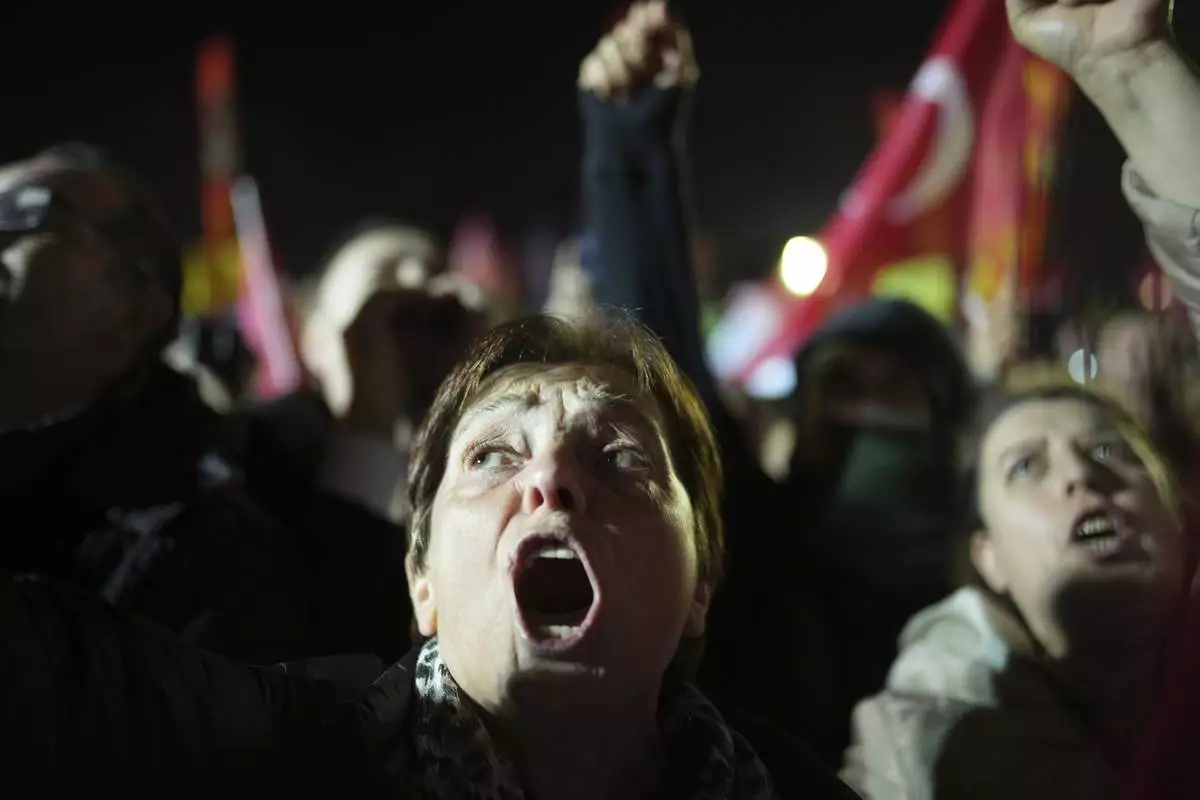
Protesters shout slogans during a protest after Istanbul's Mayor Ekrem Imamoglu was arrested and sent to prison, in Istanbul, Turkey, Tuesday, March 25, 2025. (AP Photo/Francisco Seco)
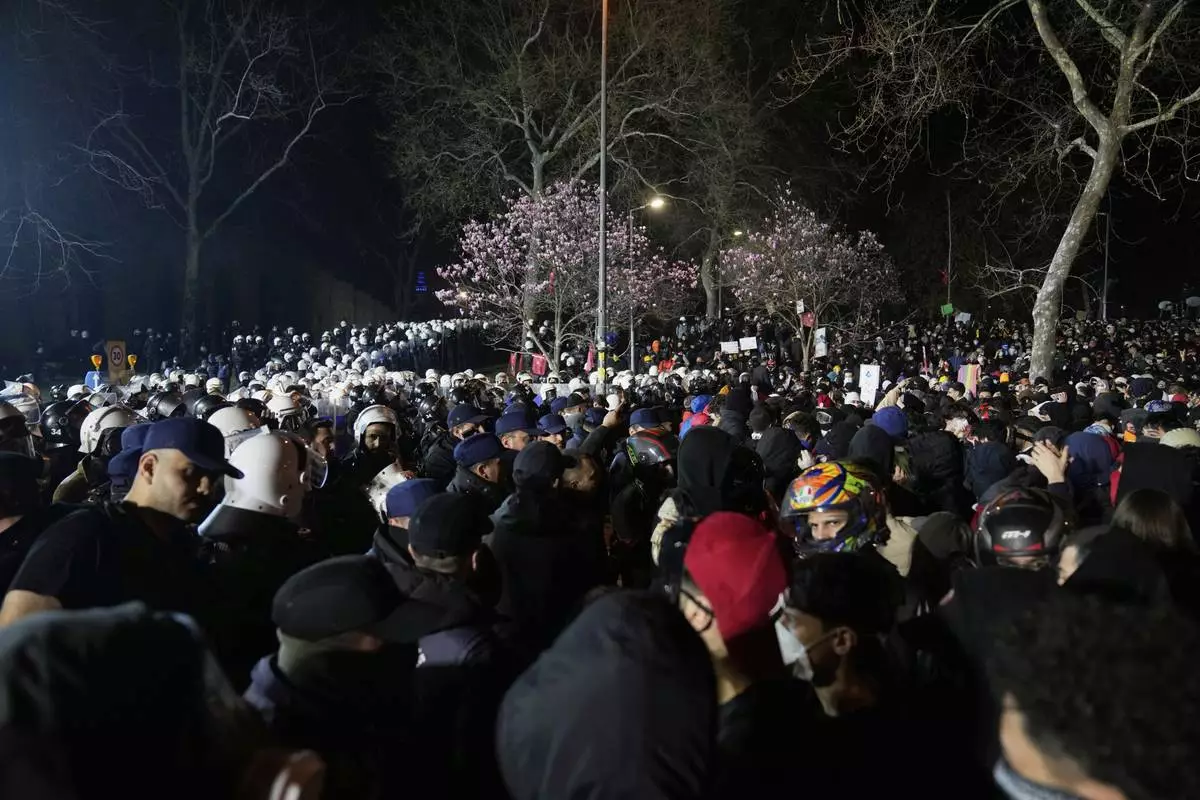
Protesters gather during a protest after Istanbul's Mayor Ekrem Imamoglu was arrested and sent to prison, in Istanbul, Turkey, Tuesday, March 25, 2025. (AP Photo/Khalil Hamra)
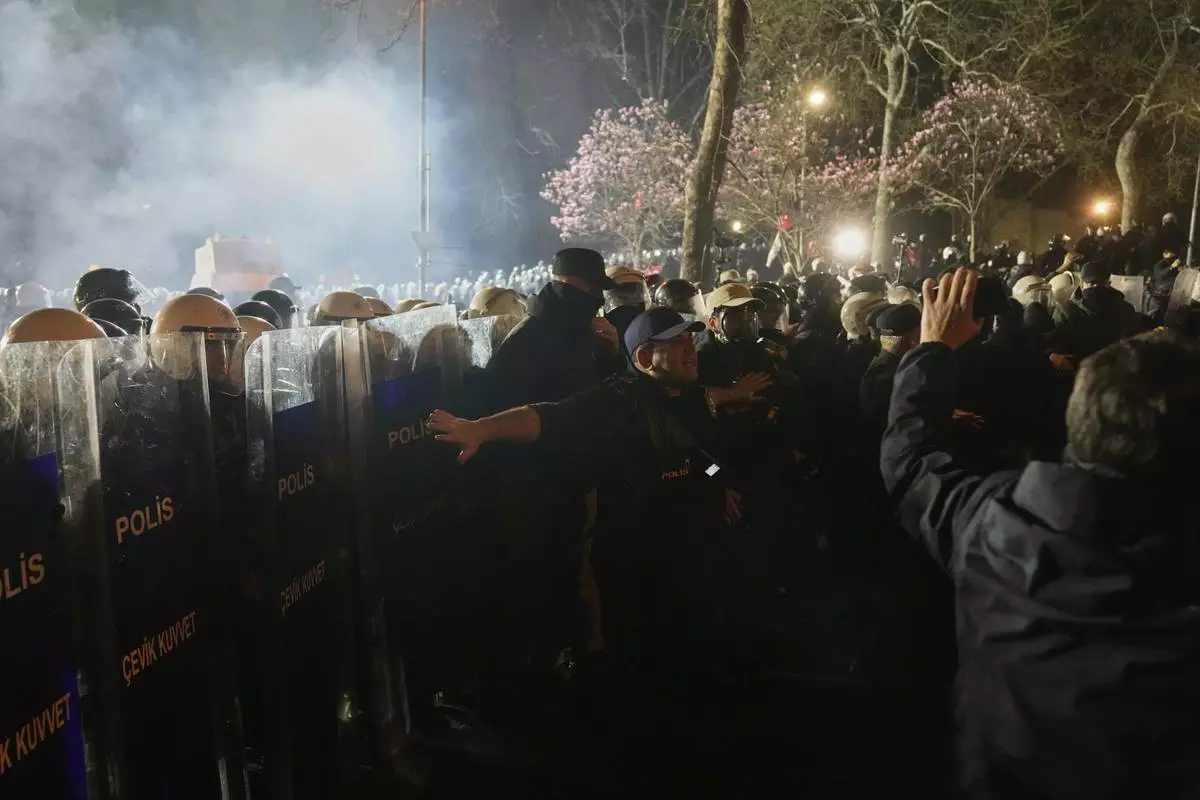
A riot police officer tries to calm down protesters during a protest after Istanbul's Mayor Ekrem Imamoglu was arrested and sent to prison, in Istanbul, Turkey, Wednesday, March 26, 2025. (AP Photo/Khalil Hamra)
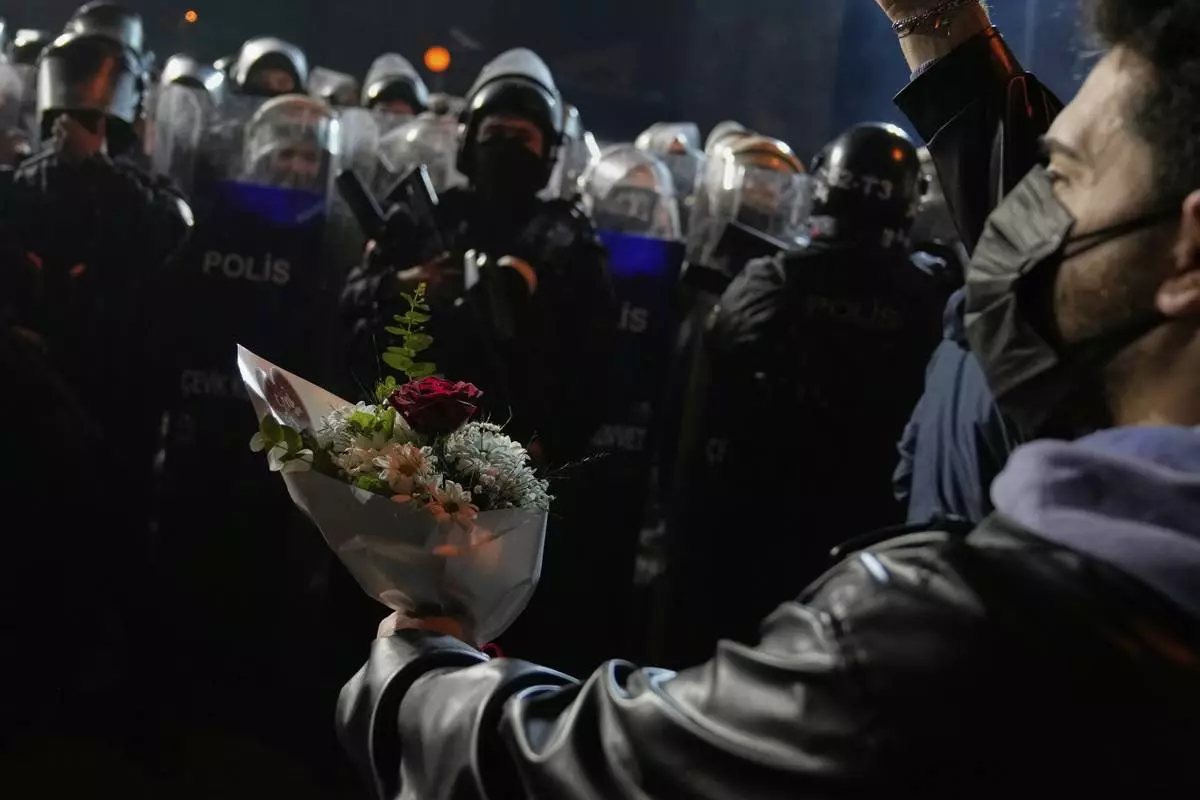
A protester offers flowers to riot police during a protest after Istanbul's Mayor Ekrem Imamoglu was arrested and sent to prison, in Istanbul, Turkey, Tuesday, March 25, 2025. (AP Photo/Khalil Hamra)
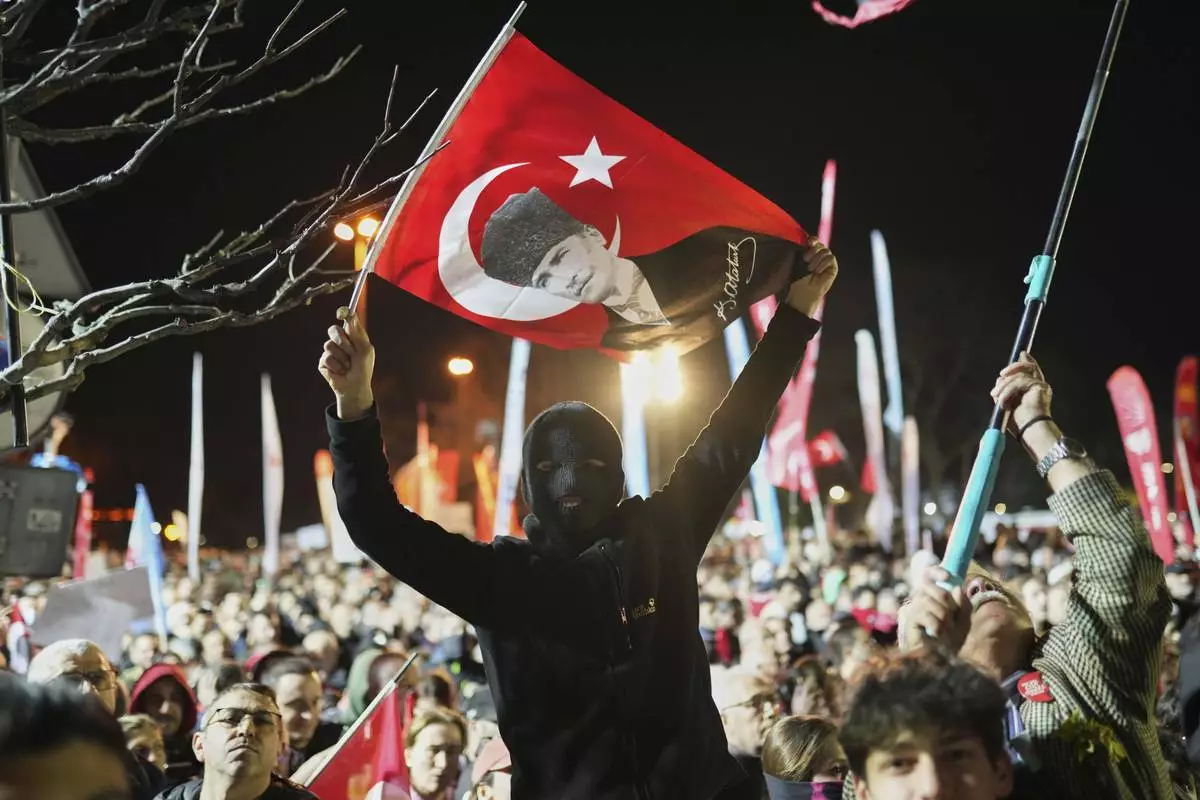
Protesters shout slogans during a protest after Istanbul's Mayor Ekrem Imamoglu was arrested and sent to prison, in Istanbul, Turkey, Tuesday, March 25, 2025. (AP Photo/Francisco Seco)
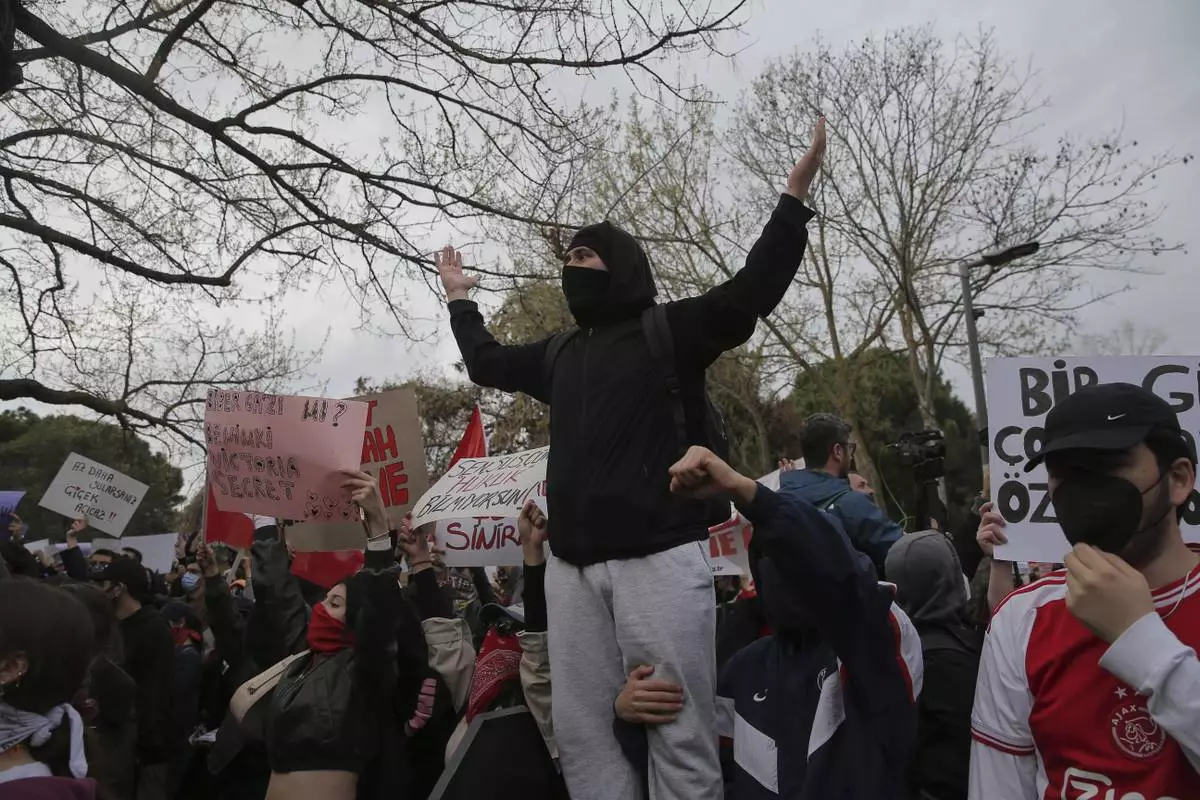
Protester shout slogans during a gathering after Istanbul's Mayor Ekrem Imamoglu was arrested and sent to prison, in Istanbul, Turkey, Tuesday, March 25, 2025. (AP Photo/Huseyin Aldemir)
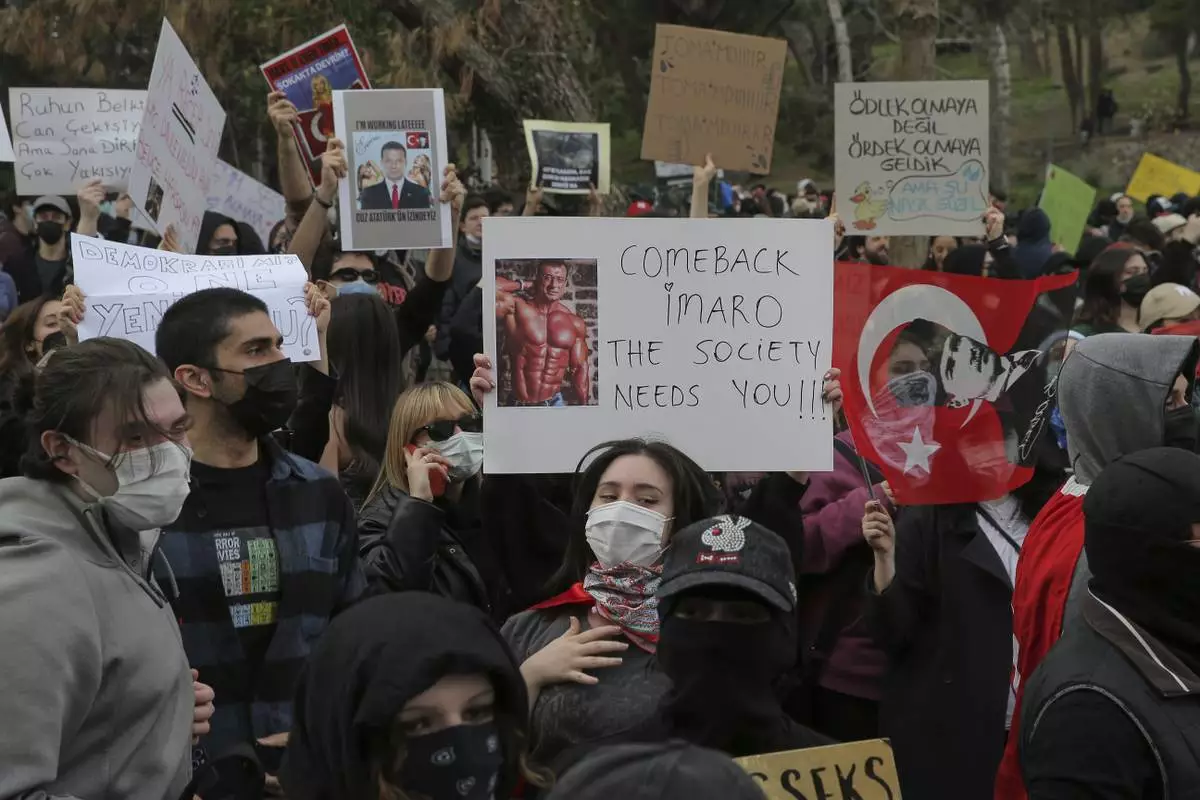
Protester shout slogans during a gathering after Istanbul's Mayor Ekrem Imamoglu was arrested and sent to prison, in Istanbul, Turkey, Tuesday, March 25, 2025. (AP Photo/Huseyin Aldemir)
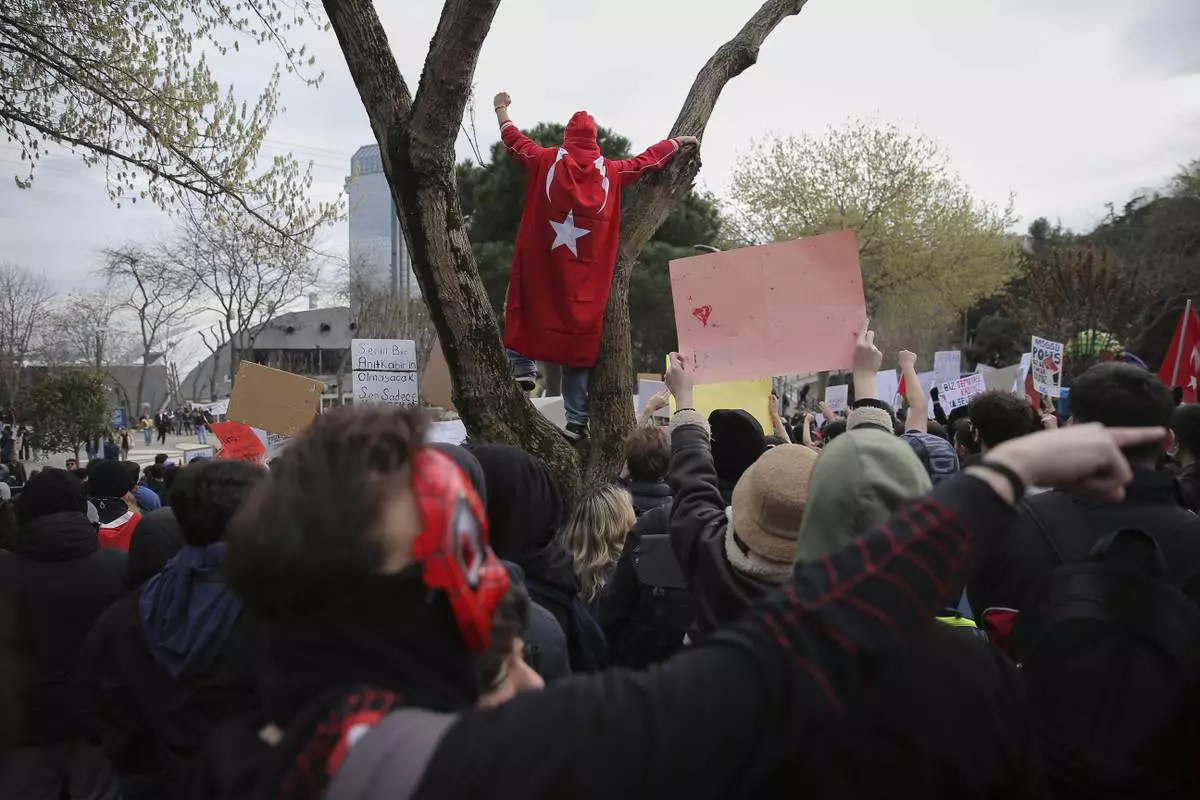
Protester shout slogans during a gathering after Istanbul's Mayor Ekrem Imamoglu was arrested and sent to prison, in Istanbul, Turkey, Tuesday, March 25, 2025. (AP Photo/Huseyin Aldemir)
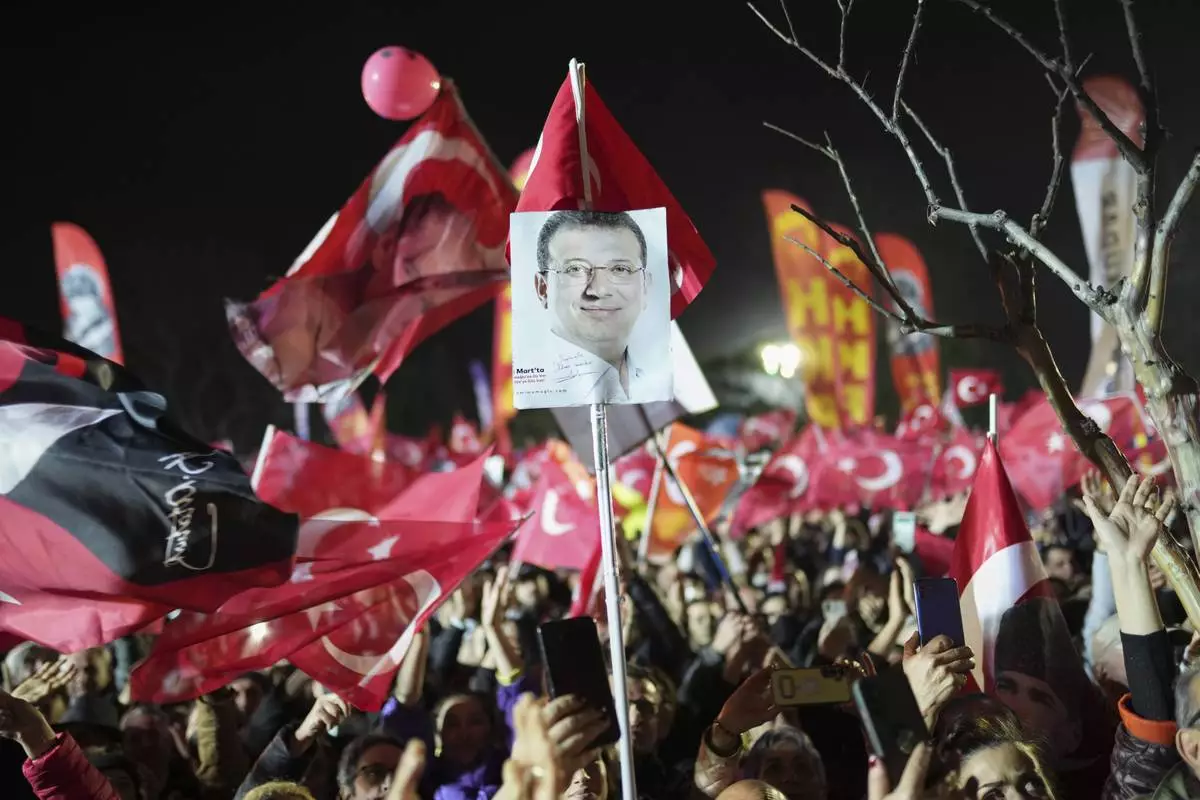
Protesters shout slogans as holds a picture of Istanbul's Mayor Ekrem Imamoglu during a protest after he was arrested and sent to prison, in Istanbul, Turkey, Tuesday, March 25, 2025. (AP Photo/Francisco Seco)
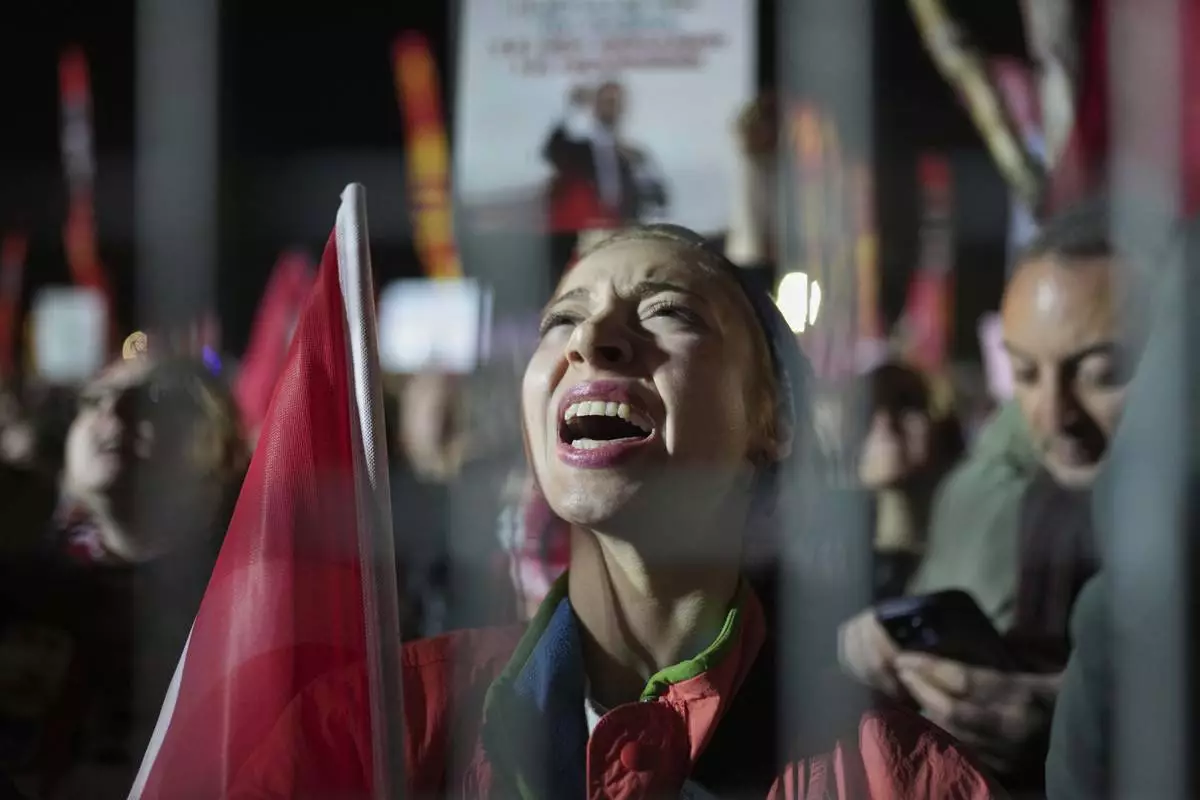
Protesters shout slogans during a protest after Istanbul's Mayor Ekrem Imamoglu was arrested and sent to prison, in Istanbul, Turkey, Tuesday, March 25, 2025. (AP Photo/Francisco Seco)
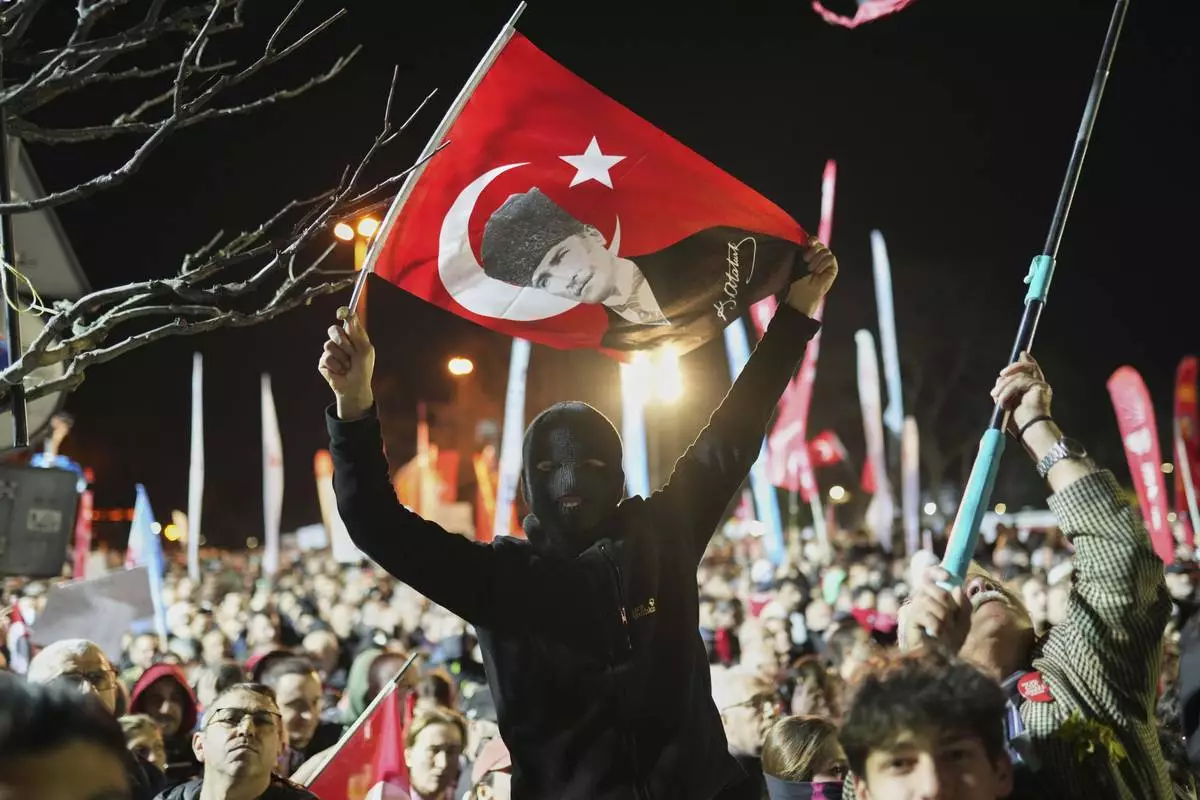
Protesters shout slogans during a protest after Istanbul's Mayor Ekrem Imamoglu was arrested and sent to prison, in Istanbul, Turkey, Tuesday, March 25, 2025. (AP Photo/Francisco Seco)
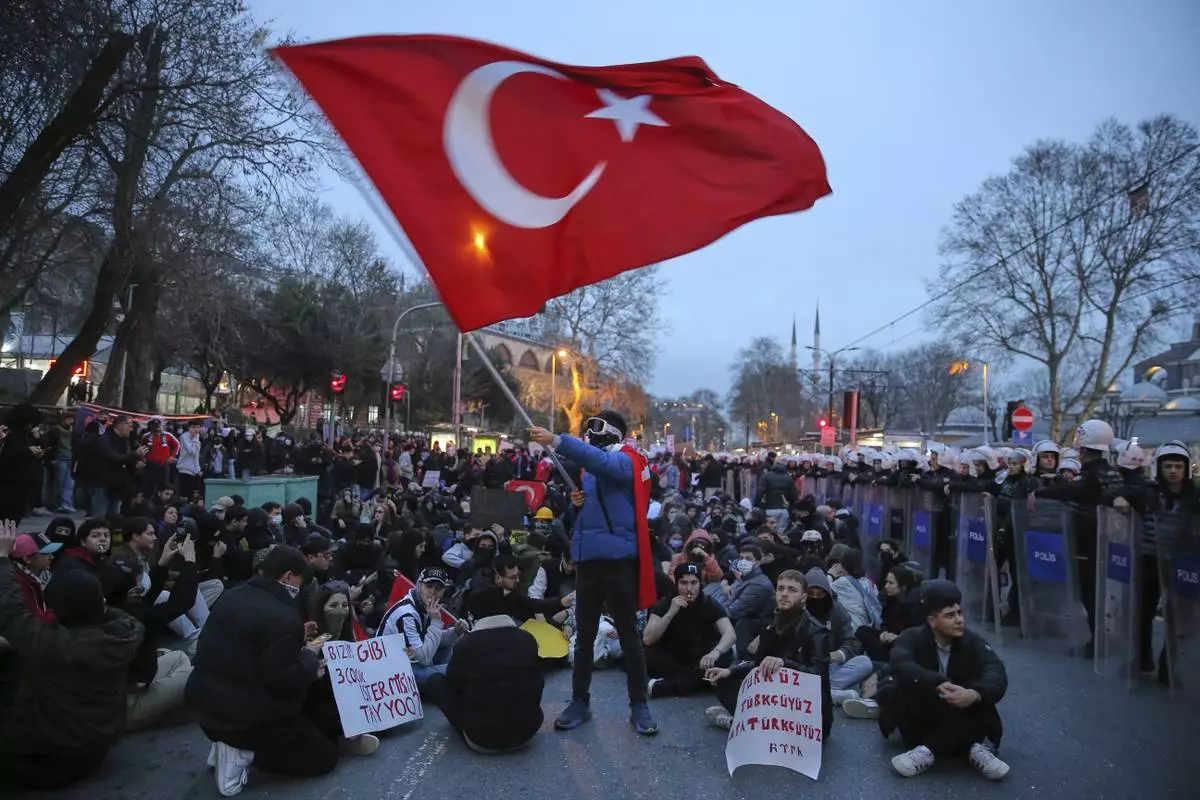
University students sit next to anti riot police officers during a protest after Istanbul's Mayor Ekrem Imamoglu was arrested and sent to prison, in Istanbul, Turkey, Monday, March 24, 2025. (AP Photo/Huseyin Aldemir)
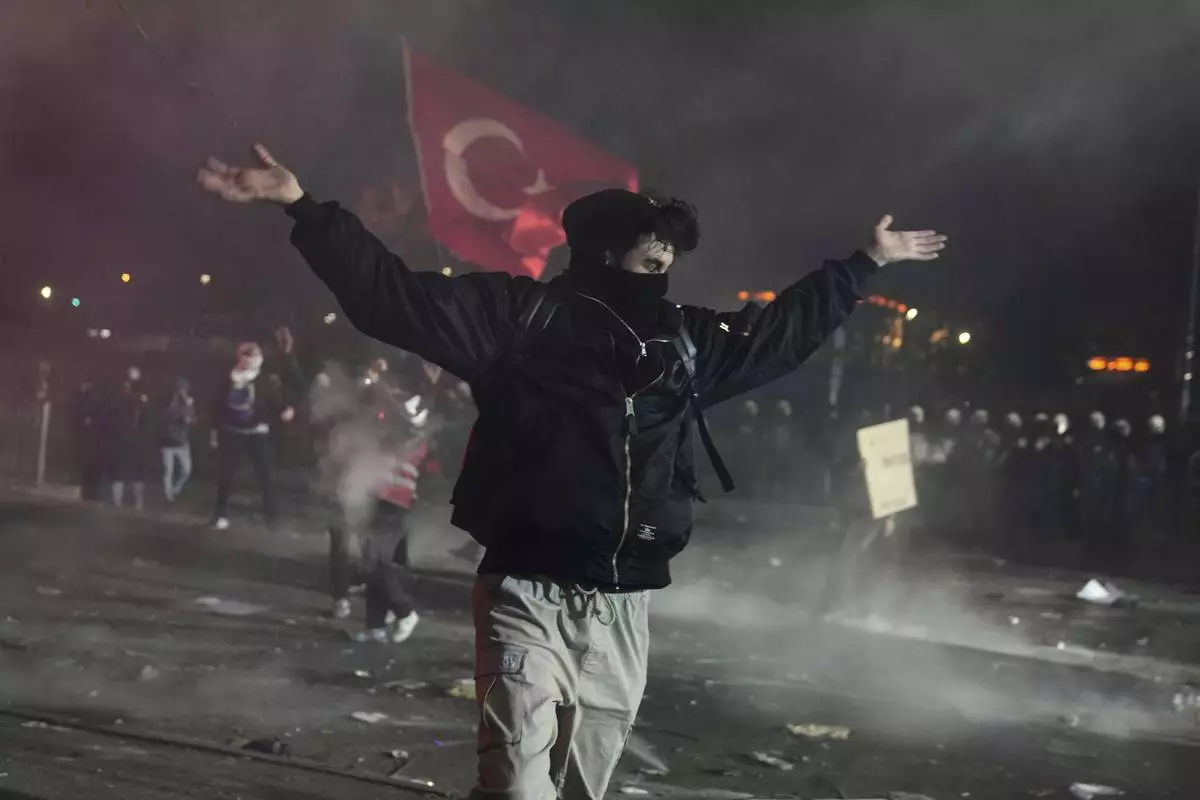
Riot police fire tear gas pellets to disperse protesters in Istanbul, Turkey, Monday, March 24, 2025, during a protest after Istanbul's Mayor Ekrem Imamoglu was arrested and sent to prison. (AP Photo/Khalil Hamra)
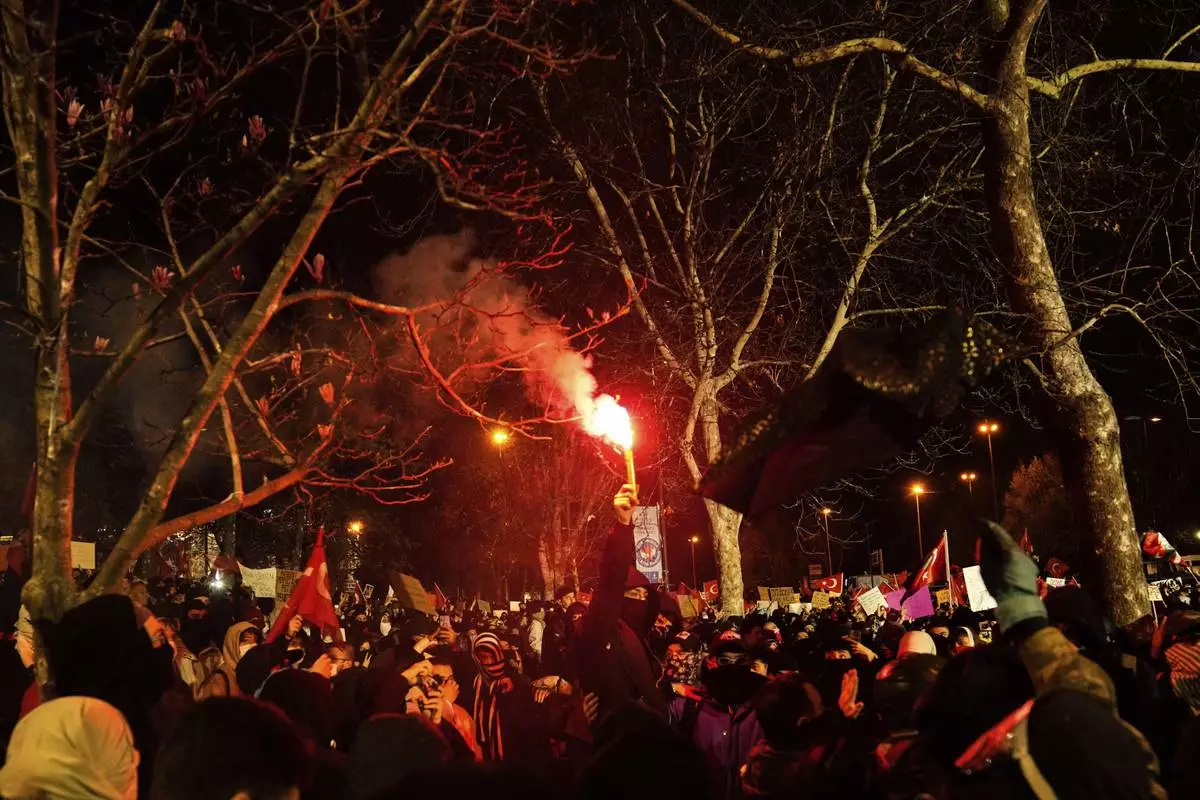
People shout slogans next to anti riot police officers during a protest after Istanbul's Mayor Ekrem Imamoglu was arrested and sent to prison, in Istanbul, Turkey, Monday, March 24, 2025. (AP Photo/Khalil Hamra)


